- Home
- Andrew Wareham
Dire Shenanigans (The Making of a Man Series, Book 2) Page 20
Dire Shenanigans (The Making of a Man Series, Book 2) Read online
Page 20
"So be it, Briggs - bland is best, you would say?"
He drove the six miles to the Sudbury house, the coachman heartening him by pointing out that the moon was full and the sky cloud-free and he knew the road like the back of his hand. He would be able to return in near-perfect safety. Country dinner parties always had to take notice of the moon, and most hosts ensured they had bedrooms available against need; if it came on to rain then guests from more than a mile away might prefer to remain overnight rather than drive blind.
The Sudburys owned land - a substantial acreage, mostly of sheepwalk on the hills but including a few hundreds of acres of good wheat land. More importantly, Sudbury had sat his terms in the Inns of Court and had been a successful barrister, tucking away a substantial sum in safe investments. Rather than become a judge, he had retired to Dorset on inheriting from his uncle whose only son had died in the Crimea. The great bulk of the local agriculturalists had been impoverished by the twenty years of depression since wheat prices had collapsed in the Forties, but the Sudburys were well-off and took a lead in the County as a consequence.
Briggs had given Dick all of the information he needed to know to survive an evening in company; particularly he had pointed out that Sudbury had a large family - no fewer than five sons and seven daughters. Although he was very well off, he could not possibly offer substantial marriage portions to his girls. The elder son, a man in his mid-twenties, was learning the land, living at home, as was to be expected; the second was an officer in the Dorsets, also requiring an income from his father; the third had gone out to India and was learning the tea trade and could be expected to become independent while the fourth had entered the Church and was to take the family living when the incumbent died, was acting as his curate the while and accepting a few hundred from his father. The youngest was no more than a schoolboy, though being educated at home. The effect was that the Sudburys were rich, but had very little money spare.
"A wealthy husband for one of the girls would therefore be very welcome, Briggs!"
"Just so, Sir Richard. Very pleasant and well brought up young ladies, too. The eldest wed last year, into another County family, and the second is to be accounted for by the Lord Lieutenant's younger son - a good match socially, if not financially."
"And how old is the third, Briggs?"
"Just seventeen, Sir Richard, and making her come-out this year. Not necessarily to appear in London as a debutante - the cost might be prohibitive and they are only just on the fringe of the set that does so."
"I must look about, in case Miss Parsons should choose to stay in America. If she should appear here then I shall have no alternative to marrying her, of course."
"Mr Williams met her several times while she was in Liverpool, Sir Richard, and believes that she conceived a disgust for England for being unable to do business here."
Dick said nothing more, but sat quietly in the carriage for the three-quarters of an hour drive over the country roads - tracks, more correctly, for none were metalled or gravelled even in the back parts of Dorsetshire.
The Sudburys occupied a fine old manor house, dating back several centuries in different parts, a large old fortified manor of mediaeval time extended repeatedly and in the styles of succeeding ages. Elegant and beautiful it was not - but it was clearly a home and cared for as such by each generation.
Two other carriages were being taken round to the yard at the rear and the front door was open to welcome the previous arrival. Dick stepped down, carefully avoiding the evidence of several other teams of horses on the gravel drive, and made his way up the three broad steps, smiling at the butler and murmuring his name.
"Thank you, Sir Richard. I had guessed you to be the sole unknown of the evening, sir, but it is as well to be quite certain!"
Always wise to be on the right side of the butler in any household, and this was a very respectable man, long in the family's service.
"My own man ordered me most strictly to avoid all possibility of embarrassment - and one must always obey one's butler's orders!"
"Very true, sir! May I lead you inside, Sir Richard?"
The butler stopped outside the door to the reception room and inspected Sir Richard's dress, quickly brushing off a speck of dust - a service he would not have offered every guest.
"Sir Richard Burke, sir!"
Sudbury, large and booming, a true lawyer, came forward to greet Dick and lead him into the introductions, mostly to the ladies who had not been at the funeral, finally to the least senior present.
"My daughter, Miss Louise Sudbury, Sir Richard."
This was the third girl, just out and hence least in consequence; Dick bowed over her hand and made his greeting, quickly assessing her.
'Handsome rather than pretty; I like that auburn hair; green eyes, unusual. Very slight in the figure, but she is still young. She seems bright enough. Let us try speaking with her.'
It occurred to him that he did not possess a dog, but he might well consider a prospective purchase in much the same way. It was the way of this world, but it struck him as slightly cold-blooded even so.
"My first dinner party in Dorset, ma'am, and so many names to remember, or to forget, more accurately!"
"And at such a disadvantage, Sir Richard, for you are the only stranger here - all of the other guests know who you must be."
She had a pleasant voice and spoke sensibly; provided she did not gush over horses she might well be a candidate for the vacant position at his side. He laughed at his own arrogance - for all he knew she might have taken him in aversion!
Her father led him into conversation with others of the guests, senior in precedence and entitled to his attention.
A very large lady, accompanied by a tiny and worn-down seeming gentleman, was interested to know of the War in the States and when the inevitable Confederate victory might be expected.
"Never, ma'am. The South could have won in the first year before the Union had called up, trained and armed its thousands. Now, Lincoln has the men and the guns, sufficient initially to hold the South at bay. Just as soon as he has found a general, he will crush the South, slowly and bloodily. The Navy has already almost closed the coast and the Mississippi is in Union hands so that the West is isolated. The South will fight, and no doubt win more battles, but the end is certain. The pity is that the South will not surrender now but that hundreds of thousands more must die."
"But the Southerners are gentlemen, Sir Richard!"
"And the North outnumber them two to one and have factories that are producing breech-loading rifles by the tens of thousands. The Southerners have plantations, ma'am. but very few factories. The Northerners are slowly learning the ways of war, ma'am, and it is the red blood they shed on the field that counts rather than the blue blood that may run in Southron veins."
Sudbury intervened to ask if the casualty figures they had read could possibly be true.
"Are they not much exaggerated by the newspaper people, Sir Richard?"
"No, sir. Antietam as an example, saw nearly twenty thousand dead, and an uncounted number wounded. The Americans will not admit themselves beaten until they have lost far too many men. Both sides will fight to the death now - how the hatred is ever to be turned to peace, I do not know."
"You have fought for the Union army, I believe, Sir Richard."
"I was journeying in the West when I was attacked by Southern guerrilla fighters, men who seemed to believe that any stranger must be an enemy. It seemed to me that if they were prepared to treat me so then I was indeed hostile to them! I joined a militia and in the way of things there rapidly was sucked into the Army. After that, events took their course."
"Then you might just as easily have joined the Confederate cause, Sir Richard?"
"No, ma'am. I would not, could not, fight for slavery."
There was a silence, several of those present having no objection at all to the Institution, some of them indeed thinking it might solve the problems they often had with
their own wage-labourers.
Sudbury turned the conversation to the prospects for the next race-meeting to be held locally, three of those present owning racehorses and interested in that topic beyond all other.
They were called to the table, Dick as senior in rank sat next to Mrs Sudbury on one side, the large lady, whose name he had forgotten, on the other.
They maintained an easy conversation, talking of the Land and the less controversial political issues of the day. As always, Ireland was discussed and regretted.
"What of the Navy, Sir Richard? One is told that the French are building great iron-clad gunboats and aim to dominate the seas in short order."
"The wooden ship can no longer live in battle, ma'am. Every line-of-battle ship must be armoured, at minimum; best would be to fabricate them wholly of steel and arm them with big turret guns - ten inch and greater. The Americans already have such guns, and we must regain an advantage over them if we are still to command the seas. I have seen the gunboats on the Mississippi and they are remarkable vessels. When they develop them as sea-going ships then they will be impregnable to the wooden man of war."
"Very expensive, Sir Richard!"
"Hugely so, ma'am - pity the poor tax-payer!"
The ladies withdrew and the gentlemen clustered at the top of the table while the port circulated. Dick noted that the bulk of the men had consumed at least one glass of wine with each course and now were punishing the decanters; there were some red faces but none showed obvious signs of drunkenness. Watching carefully, refilling his glass well before it was empty so as not to make a show of abstention, he saw that in fact almost one half of the younger men drank as little as him - the generations had very different habits, it seemed.
"Mr Mortimer tells me that you are looking for a piece of land to add to your little estate, Sir Richard."
"I am indeed, Mr Sudbury. The Home Farm my father purchased is all very well, but not really sufficient for the needs of a family. I would like to create a small park, if it be possible, and that demands contiguous acres of course."
The statement served to announce that the Burkes were at least as rich as rumour had insisted - a park was not for those in straitened circumstances.
"I am told that almost every small man in Dorset will sell if an offer is made, Sir Richard - there is no living left in agriculture in England, sir!"
"Not in wheat, or other grains, I agree, sir. The American and Canadian prairies stretch rich and almost flat for hundreds of miles and their railroads are opening them to the farmer, even during this war. It is no exaggeration to say that there will be millions of tons more crossing the Atlantic within a very few years."
"Then what is the landowner to do, Sir Richard?"
"Change, sir. Perhaps into beef? Or milk and cheese? If none of these, then perhaps apples and pears or potatoes and cabbages. I am no farmer, sir, and I fear I can offer little that is sensible. All I know is that wheat is dead in England."
The opinion was not popular; they could not change - they had always farmed in the same way and it was not reasonable to expect them to do anything different. The government must do something!
The next hour was devoted to consideration of just what the government must do. Dick stayed silent as they agreed, with remarkable unanimity, that industry must be taxed so that government money could be placed in the farmers' pockets. For some strange reason, that none attempted to explain, agriculturalists were 'different' and must not be motivated by consideration of profit or the well-being of the country as a whole. Dick debated saying 'Adam Smith' at them, but most would have thought he was a racehorse so it was pointless.
They joined the ladies, who were busily deploring the continued seclusion of the Queen. Mourning was all very well, but there was reason in all things and Her Majesty must show herself in public again; she had a duty to her people.
Dick had been away, as all knew, was unaware of the undercurrents and inadvisably enquired whether it might not be possible to bring the young Prince forward to take some of his bereft mother's duties.
"Not entirely appropriate, Sir Richard, in the circumstances. The young man is said by some to be a little unsteady."
"Ah... The family weakness, perhaps?"
None would comment on that. His great-grandfather's insanity was not to be discussed.
"One understands the Prime Minister to be aggrieved that he must travel for hours at a time to consult with Her Majesty, who is to be found most often at Windsor rather than in London. Very commonly she chooses the wilds of Scotland, in fact - days away from civilisation!"
Sudbury was clearly disapproving, but implied that there were benefits as well - the Queen being distant from public affairs must have less influence upon them.
Dick sat back as the younger ladies prepared to entertain the company with music - an obligatory part of the evening and often a penance upon the auditors. He had little knowledge of music and was unused to listening to it, but was prepared to be seen to be enthusiastic, as Briggs had explained was demanded of the genteel.
Miss Louise Sudbury took to the pianoforte to offer a sonata by Herr Beethoven for piano and violin, Mrs Arthur to play beside her.
"The Fourth Sonata, which has the advantage of lasting less than twenty minutes," his nearest companion, Captain Cornforth whispered.
Both players were competent, as far as Dick could tell; certainly his ears were not offended by their offering and he joined in the applause that followed. Others then stood to offer various songs, mostly traditional English in nature, though with carefully expurgated verses. Dick grinned quietly - he had heard more rigorously accurate versions around the campfires in the States. The English were a race much given to vulgarity, he reflected. He noticed that Miss Louise remained at the pianoforte to accompany each singer - he presumed she was locally renowned for her talent on the instrument.
He asked Cornforth in an interval of conversation whether the young lady was known for her musical gifts.
"Too much so, Sir Richard. Rather be sat at the music stool than out on a horse where a young miss ought to be. Too much of this damned education and blue-stocking, you know, sir. Not for me! She reads books, you know!"
Music came to an end and the tea tray appeared, together with a number of glasses for those whose constitution could not tolerate the alien substance.
Dick accepted his cup and saucer and stood in the background, quietly shifting until he came into conversational range of Miss Louise.
"Is Herr Beethoven a favourite of yours, ma'am?"
"Very much so, Sir Richard, though I have also an affection for his rival, Herr Hummel, among the Germans, that is. Had I only the talent, I should venture upon Herr Mozart - but he demands a delicacy of touch that is beyond me, I fear."
"I am afraid that I know almost none of their work, ma'am. That is a pity, I suspect, for I much enjoyed your playing."
The party broke up soon after and Dick endured the slow journey to Burkes, the driver knowing the road but unable to avoid all of the potholes in the near darkness and bumping Dick unmercifully. He was glad he had drunk very little.
Mr John Meridew paid a morning visit just three days later. He transpired to be the undersized and much put-upon husband of the large lady who had expressed her support for the Confederate aristocracy. He enjoyed a glass with Dick and spoke a little of local affairs before venturing upon his business of the day.
"I could not help but hear, Sir Richard, that you are interested to purchase land that runs with your existing acres. I have a swathe of hill and rough pasture that borders you on the west, sir. Poor land, I will be the first to admit, and inherited only a very few years ago from the maiden elder sister of my respected mother; she suffered a disappointment in her youth when her young man went to the wars and did not return and so never wed. There was no brother and she succeeded to the family land and left all to me in her declining years. It is not entailed, as a result, and is some little distance from my other acres, and, to
be frank, requires much work and expenditure to bring it to the plough or even to make a worthwhile sheep-walk."
Dick noted that Meridew farmed his own land - he had no agent.
Peckham, the lawyer, had warned Dick that to sell one's acres was commonly seen as a disgrace and that those prepared to take such a course might well spend hours justifying themselves.
"It will, in fact, Mr Meridew, do far better as parkland, you think. It may well be just what I am looking for, sir. Of what acreage are we talking, sir?"
"Seven hundred acres of hill and six of valley, Sir Richard. Roughly wooded for the most part, the valley, in fact."
Dick had taken notice of local land prices and could see a cost of ten thousands or thereabouts, which was well within his pocket.
"I have not ridden the land, as goes without saying, Mr Meridew. We could perhaps make some arrangement to do so in the near future and then discuss a price for the acreage, if it suits my needs. My dear father has left me an amount of cash for the purpose of establishing myself properly, though I must in all honesty say that yours is not the only suggestion that has come my way, sir."
They parted, agreeing to inspect the land after the weekend. Dick made his way immediately to Blandford and Peckham's office.
"Meridew, Mr Peckham. What can you tell me of him, other than that he has an overbearing wife?"
"He has an expensive son, Sir Richard, the darling of his mother, dwelling in rooms in London and wasting much of the family substance. I would be surprised to hear that the young man did not have debts, and probably of a substantial nature. Meridew has no close friends, unfortunately, to whom he is likely to have told the tale, or none who would speak to me. It will take a few days to discover the sums involved, and I suspect I may not have the information in time to assist you. I can discover a reasonable price for the acres in question and will have that to your hand by Sunday at latest, Sir Richard. I will also have a word with Mr Branksome who is manager in the bank here and an old acquaintance; it is amazing what might turn up from such a source."

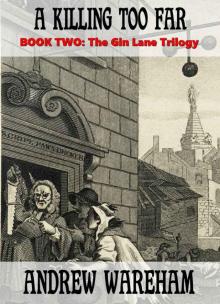 A Killing Too Far
A Killing Too Far Killing's Reward
Killing's Reward A New Place
A New Place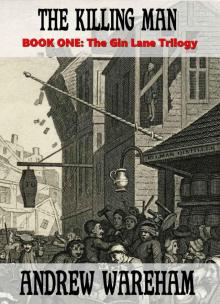 The Killing Man
The Killing Man Bold and Blooded
Bold and Blooded The Breaking Storm (Innocent No More Series, Book 2)
The Breaking Storm (Innocent No More Series, Book 2) Nobody’s Child
Nobody’s Child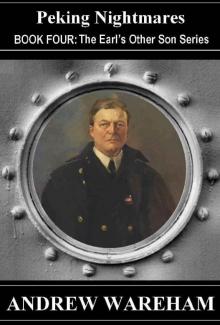 04 Peking Nightmares (The Earl’s Other Son Series, #4)
04 Peking Nightmares (The Earl’s Other Son Series, #4)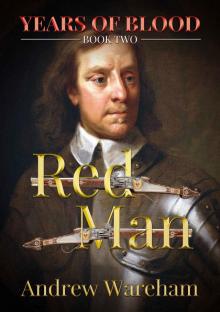 Red Man
Red Man Foreign Mud
Foreign Mud The Gathering Clouds (Innocent No More Series, Book 1)
The Gathering Clouds (Innocent No More Series, Book 1) 06 A Soldier’s Farewell (Man of Conflict #6)
06 A Soldier’s Farewell (Man of Conflict #6) Chinese Whispers
Chinese Whispers 02 Shanghai Dreams (The Earl’s Other Son #2)
02 Shanghai Dreams (The Earl’s Other Son #2) Hungry Harry: An Orphan in the Ranks
Hungry Harry: An Orphan in the Ranks A Wretched Victory (Innocents At War Series, Book 6)
A Wretched Victory (Innocents At War Series, Book 6) Illusions Of Change (A Poor Man at the Gate Series Book 6)
Illusions Of Change (A Poor Man at the Gate Series Book 6) The Wages Of Virtue (A Poor Man at the Gate Series, Book 8)
The Wages Of Virtue (A Poor Man at the Gate Series, Book 8) Blood and Famine (Man of Conflict Series, Book 4)
Blood and Famine (Man of Conflict Series, Book 4) The Friendly Sea (The Duty and Destiny Series, Book 1)
The Friendly Sea (The Duty and Destiny Series, Book 1) Bursting Balloons (Innocents At War Series, Book 5)
Bursting Balloons (Innocents At War Series, Book 5) The Death of Hope
The Death of Hope Deadly Shores (The Duty and Destiny Series, Book 11)
Deadly Shores (The Duty and Destiny Series, Book 11) The Vice Of Virtue (A Poor Man At The Gate Series Book 10)
The Vice Of Virtue (A Poor Man At The Gate Series Book 10) Virtue’s Reward (A Poor Man at the Gate Series, Book 11)
Virtue’s Reward (A Poor Man at the Gate Series, Book 11) A Deadly Caper (Innocents At War Series, Book 2)
A Deadly Caper (Innocents At War Series, Book 2)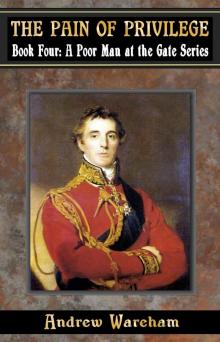 The Pain Of Privilege (A Poor Man at the Gate Series Book 4)
The Pain Of Privilege (A Poor Man at the Gate Series Book 4) Far Foreign (The Duty and Destiny Series, Book 9)
Far Foreign (The Duty and Destiny Series, Book 9)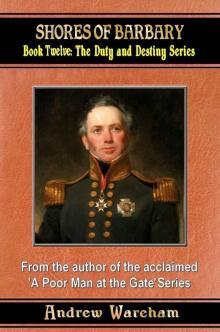 Shores of Barbary (The Duty and Destiny Series, Book 12)
Shores of Barbary (The Duty and Destiny Series, Book 12)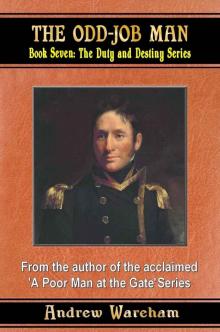 The Odd-Job Man (The Duty and Destiny Series, Book 7)
The Odd-Job Man (The Duty and Destiny Series, Book 7) Fire and Folly (Man of Conflict Series Book 3)
Fire and Folly (Man of Conflict Series Book 3) A Victorian Gent (The Making of a Man Series, Book 1)
A Victorian Gent (The Making of a Man Series, Book 1)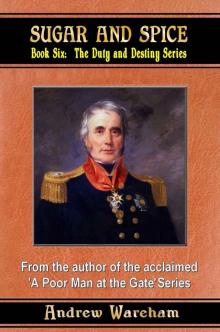 Sugar and Spice (The Duty and Destiny Series, Book 6)
Sugar and Spice (The Duty and Destiny Series, Book 6) Dark Days Of Summer (Innocents At War Series, Book 4)
Dark Days Of Summer (Innocents At War Series, Book 4) Dire Shenanigans (The Making of a Man Series, Book 2)
Dire Shenanigans (The Making of a Man Series, Book 2) The Fuzzy-Wuzzy Man (The Duty and Destiny Series, Book 3)
The Fuzzy-Wuzzy Man (The Duty and Destiny Series, Book 3)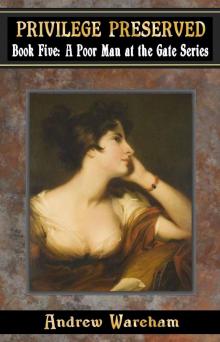 Privilege Preserved (A Poor Man at the Gate Series Book 5)
Privilege Preserved (A Poor Man at the Gate Series Book 5) No Longer A Game (Innocents At War Series, Book 3)
No Longer A Game (Innocents At War Series, Book 3)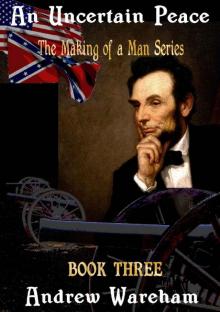 An Uncertain Peace (The Making of a Man Series, Book 3)
An Uncertain Peace (The Making of a Man Series, Book 3)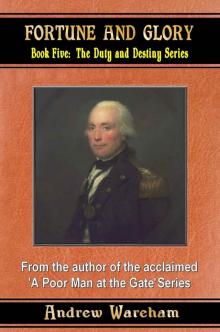 Fortune And Glory (The Duty and Destiny Series, Book 5)
Fortune And Glory (The Duty and Destiny Series, Book 5) The Old Order (A Poor Man at the Gate Series Book 7)
The Old Order (A Poor Man at the Gate Series Book 7) A Place Called Home (Cannibal Country Trilogy, Book 2)
A Place Called Home (Cannibal Country Trilogy, Book 2) Nouveau Riche (A Poor Man at the Gate Series, Book 2)
Nouveau Riche (A Poor Man at the Gate Series, Book 2) The Privateersman (A Poor Man at the Gate Series Book 1)
The Privateersman (A Poor Man at the Gate Series Book 1) Britannia’s Son (The Duty and Destiny Series, Book 4)
Britannia’s Son (The Duty and Destiny Series, Book 4) Long Way Place (Cannibal Country Trilogy, Book 1)
Long Way Place (Cannibal Country Trilogy, Book 1) Spanish Tricks (Man of Conflict Series, Book 5)
Spanish Tricks (Man of Conflict Series, Book 5) A Parade Of Virtue (A Poor Man At The Gate Series Book 9)
A Parade Of Virtue (A Poor Man At The Gate Series Book 9) A Busy Season (The Duty and Destiny Series, Book 8)
A Busy Season (The Duty and Destiny Series, Book 8) Billy Bacon and the Soldier Slaves (Colonial Warrior Series, Book 1)
Billy Bacon and the Soldier Slaves (Colonial Warrior Series, Book 1) Raging Rajahs (Man of Conflict Series, Book 2)
Raging Rajahs (Man of Conflict Series, Book 2)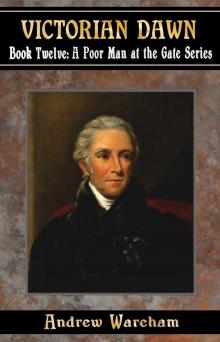 Victorian Dawn (A Poor Man at the Gate Series, Book 12)
Victorian Dawn (A Poor Man at the Gate Series, Book 12) Born To Privilege (A Poor Man at the Gate Series Book 3)
Born To Privilege (A Poor Man at the Gate Series Book 3) The Soldier Brat (Man of Conflict Series, Book 1)
The Soldier Brat (Man of Conflict Series, Book 1)